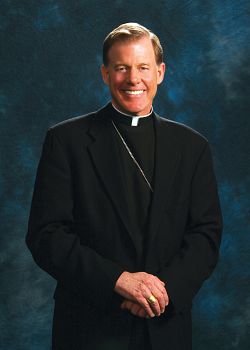New Utah law shows disdain for immigrants
As I mentioned in a previous column, I understand the efforts of Governor Gary Herbert and some legislators to pass more humane immigration-related legislation during the 2011 Utah Legislative session. However, when states get involved in federal immigration questions, it typically makes matters worse and Utah's H.B. 497 Utah Illegal Immigration Enforcement Act is no exception.
Throughout the immigration reform debate on both the state and national levels, the U.S. Conference of Catholic Bishops, immigration law experts, and the Catholic Diocese of Salt Lake City have taken strong positions against enforcement-only provisions. Utah's version of enforcement-only, House Bill 497 Utah Illegal Immigration Enforcement Act, was signed into law by Governor Gary Herbert and will take effect on May 10, 2011. As with Arizona's enforcement-only provision, the law attacks a vulnerable immigrant population without recognizing the vital role immigrants play in our society.
The new law requires all Utahns to carry identification or face questioning regarding immigration status. Under the statute, law enforcement officers must ask for identification whenever they stop, detain, or arrest an individual. If the person is arrested for a felony (such as carrying illegal weapons) or class A misdemeanor (most drug possession cases, stalking) and has no identification, the officer is required to check immigration status. If the offense is class B misdemeanor (such as simple assault) or class C misdemeanor (jaywalking), a law enforcement officer is given leeway to decide whether to further investigate immigration status before arresting the person. If the person is arrested for one of these lesser misdemeanors, the officer must attempt to verify the person's immigration status.
The statute allows the officer to accept a person's assertion that he or she is a citizen as sufficient verification. Or, the officer may investigate immigration status if the officer has "reasonable suspicion" that the person's assertion of citizenship is false.
Therein lays one of the biggest challenges of the law. What would give rise to a "reasonable suspicion" that the person who says he or she is a citizen is not being truthful? It could be that the person seems nervous-and many law-abiding citizens become nervous when talking to a police officer. Or it could be that the person fits a particular stereotype associated with undocumented individuals. Though the law itself states that race, color or national origin may not be used when deciding to investigate immigration status, the law does not provide a meaningful standard for officers to use when making that determination.
The Diocese, along with the U.S. Conference of Catholic Bishops, the Catholic Legal Immigration Network, Inc., and other immigration law experts, is also concerned about the overall message sent by this enforcement-only provision. While Utah also passed two bills ostensibly designed to provide legal status to immigrant workers, neither bill takes effect until 2013, and may never take effect unless the federal government decides to let each state experiment with citizenship programs. Thus, for the next two years the only message to the undocumented community in Utah is one of disdain.
While we support following the rule of law, we do not support the current immigration system that allows businesses to continue to hire and mistreat undocumented labor, but provides no protection for the workers. Immigration law must recognize that all benefit from integrating and supporting diverse individuals and families in our communities, and that all lose when one group is treated with disregard and mistrust.
H.B. 497 is just another example of why immigration reform at the federal level is necessary. As a state, we need our law enforcement officers to investigate violations of state criminal laws, not federal immigration statutes. And we need comprehensive laws that address the human side of immigration. As a nation and a state, we must stop telling undocumented immigrants that we want the economic benefits they provide, while at the same time insisting that they are on their own if they are caught providing those benefits. We must always remember that we are dealing with human beings when discussing or enacting immigration reforms, not just legal terms or economic impacts.
© Copyright 2025 The Diocese of Salt Lake City. All rights reserved.


Stay Connected With Us